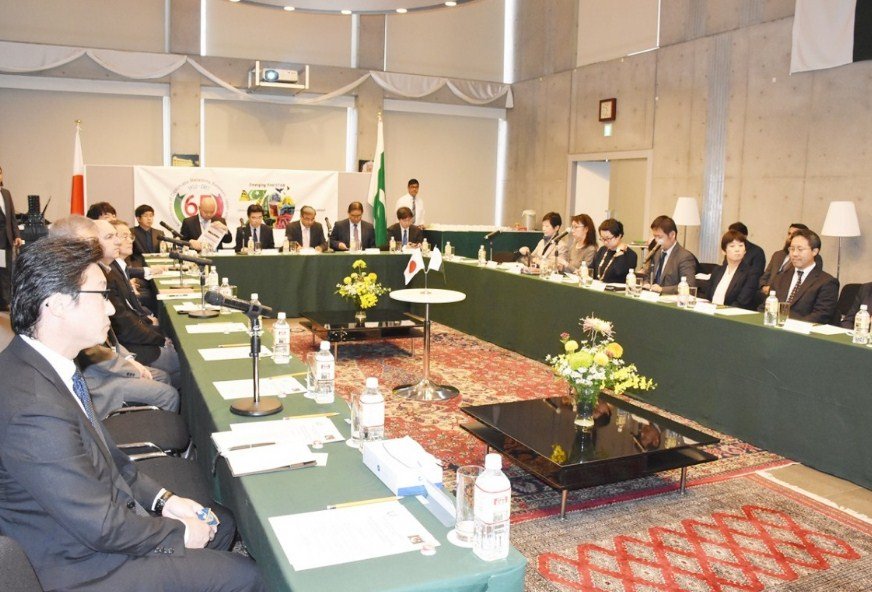Profound Vision hosts a joint event with DONUTS and Kochi government
Profound Vision, a company that provides skilled IT resources from Pakistan to Japan, organised a seminar in association with DONUTS, a leading Japanese IT firm and the Kochi prefectural government of Japan. The seminar, held on December 13, 2023, aimed to explore the potential for collaboration and exchange of information technology between the two countries.
The seminar was attended by representatives from various sectors, including education, business, commerce, and government. The speakers highlighted the current state of IT development and innovation in Japan and Pakistan, and discussed the challenges and opportunities for cooperation. They also shared their experiences and best practices in IT projects and solutions.
The seminar was part of Profound Vision’s efforts to bridge the ICT engineer gap between Pakistan and Japan, which is estimated to reach 800,000 by 2030. Profound Vision has launched a recruitment web portal, FiTE [Foreign IT Engineers], to connect Pakistani IT engineers with Japanese employers. FiTE is the first bilingual system designed specifically for the Japanese market, and is built with Pakistani technology.
HEC Chairman appreciates the initiative
The chief guest of the seminar was Dr. Mukhtar Ahmed, the Chairman of the Higher Education Commission (HEC) of Pakistan. He appreciated the initiative of Profound Vision and its partners, and said that it would benefit both countries in terms of IT development and revenue generation. He said that Pakistan has a large pool of talented and qualified IT engineers, who can offer their services to friendly countries like Japan.
He also briefed the audience about the role of HEC in promoting IT education and research in Pakistan. He said that 163 out of 244 Pakistani universities offer IT-related programmes, and 108 universities offer engineering programmes. He said that over 40,000 Pakistani students are currently graduating in IT every year.
He also mentioned the long history of relations between Pakistan and Japan, and thanked the Japan International Cooperation Agency (JICA) for its support and assistance in various fields, including higher education. He expressed his hope that Pakistan and Japan would learn from each other and expand their collaboration in IT and other sectors.
Japanese speakers share their insights and expectations
The seminar also featured several speakers from Japan, who shared their insights and expectations from the Pakistani IT engineers. Nobou Shiobara, the CEO of Profound Vision, explained the background and objectives of FiTE, and said that it was a response to the growing demand for IT manpower in Japan, due to its low birthrate, aging population, and lack of young software engineers and IT programmers. He said that Profound Vision and HEC would sign an MoU in the near future to explore different avenues of recruiting Pakistani ICT engineers.
Kazu Yamaguchi, the Director General of the Japan External Trade Organisation (JETRO), gave an overview of the IT industry and market in Japan, and the opportunities and challenges for foreign IT engineers. He said that Japan is a leader in IT innovation and quality, and has a strong demand for IT solutions in various sectors, such as manufacturing, healthcare, education, and entertainment. He said that Japan welcomes foreign IT engineers who can meet its standards and expectations, and contribute to its economic and social development.
Takashi Yamada, the Director of the Kochi Prefectural Government’s IT Promotion Division, introduced the IT initiatives and policies of Kochi, a prefecture in Japan’s Shikoku region. He said that Kochi is a pioneer in IT development and application, and has implemented several projects, such as smart agriculture, smart tourism, and smart education. He said that Kochi is looking for IT partners who can help it achieve its vision of becoming a smart and sustainable region.
Pakistani speakers showcase their achievements and potential
The seminar also included some speakers from Pakistan, who showcased their achievements and potential in IT. Imtiaz Ahmed, the former Ambassador of Pakistan to Japan, shared his personal and professional experience of living and working in Japan, and the cultural and social aspects of the Japanese society. He said that Pakistan and Japan have a lot in common, and can benefit from each other’s strengths and expertise. He advised the Pakistani IT engineers to learn the Japanese language and culture, and to respect the Japanese work ethics and values.
Dr. Ali Raza, the Dean of the Faculty of Computer Science and Engineering at the National University of Sciences and Technology (NUST), presented some of the research and innovation projects of NUST in IT, such as artificial intelligence, big data, cloud computing, and cyber security. He said that NUST is one of the leading universities in Pakistan and the region, and has a strong collaboration with the Japanese universities and institutions. He said that NUST is ready to provide quality IT education and training to the Pakistani IT engineers who want to work in Japan.
Sana Khan, the CEO of TechSavvy, a Pakistani IT company that provides web and mobile solutions to the Japanese clients, shared her success story and challenges of working in the Japanese market. She said that TechSavvy has been working with DONUTS for the past three years, and has delivered several projects, such as e-commerce platforms, online games, and social media applications. She said that TechSavvy has learned a lot from the Japanese IT firm, and has also adapted to the Japanese culture and expectations. She said that TechSavvy is looking forward to expanding its business and network in Japan, and to hiring more Pakistani IT engineers through FiTE.
The seminar concluded with a vote of thanks from the organisers and a networking session among the participants. The seminar was well-received by the audience, who expressed their interest and appreciation for the initiative and the speakers.

